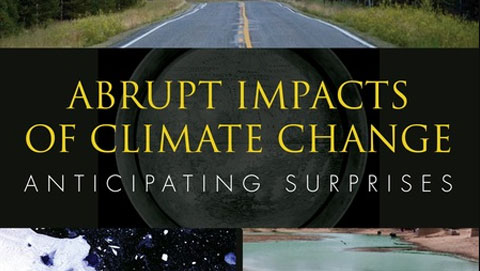NRC: Abrupt Impacts of Climate Change (2013)
Changes in climate that can trigger abrupt changes in other physical, biological, and human systems present possible threats to nature and society.
National Research Council
Abrupt Impacts of Climate Change: Anticipating Surprises | Release URL
Both abrupt changes in the physical climate system and steady changes in climate that can trigger abrupt changes in other physical, biological, and human systems present possible threats to nature and society. Abrupt change is already underway in some systems, and large scientific uncertainties about the likelihood of other abrupt changes highlight the need for further research. However, with recent advances in understanding of the climate system, some potential abrupt changes once thought to be imminent threats are now considered unlikely to occur this century. This report summarizes the current state of knowledge on potential abrupt changes to the ocean, atmosphere, ecosystems, and high latitude areas, and identifies key research and monitoring needs. The report calls for action to develop an abrupt change early warning system to help anticipate future abrupt changes and reduce their impacts.
Key Messages from the Expert Report
- There is a new recognition that, in addition to abrupt changes in the climate system itself, steady climate change can cross thresholds that trigger abrupt changes in other physical, natural, and human systems.
- The report highlights two abrupt changes that are already underway, making these changes a primary concern for near-term societal decision making and a priority for research. First, warmer Arctic temperatures have caused a rapid decline in sea ice over the past decade, with potential impacts on the Arctic ecosystem and on Arctic shipping and resource extraction. Another abrupt change already underway is increased extinction pressure on plant and animal species; this gradual climate pressure, in combination with other sources of habitat loss, degradation, and over-exploi¬tation, is already putting some species at greater risk of extinction.
- Large uncertainties about the likelihood of some potential abrupt changes highlight the need for expanded research and monitoring. For example, as climate warms, the destabilization of the West Antarctic Ice Sheet could raise sea level rapidly, with serious consequences for coastal communities.
- Two decades of focused research has helped scientists determine that some abrupt changes, widely discussed in the scientific literature because they were once identified as potential threats, are unlikely to take place over the near term. In particular, the probability of a rapid shutdown within this century of the Atlantic Meridional Overturning Circulation is now understood to the low. In addition, a rapid release of methane from either thawing permafrost or methane hydrates is now considered unlikely to occur this century.
- With improved scientific monitoring and a better understanding of the climate system it could be possible to anticipate abrupt change before it occurs, and reduce the potential consequences. Building this ability will require careful monitoring of climate conditions, improved models for projecting changes, and the interpretation and synthesis of scientific data using novel analysis techniques.
- The committee believes that action is needed to develop an abrupt change early warning system. Such a system would be part of an overall risk management strategy, providing information for hazard identification and risk assessment. These data would help identify vulnerabilities to assist in tailoring risk mitigation and preparedness efforts and to ensure warnings result in appropriate protective actions, with the ultimate goal of preempting catastrophes.
- Much is already known about the design, implementation, and sustainability of early warning systems. Planning for an abrupt change early warning system would benefit from leveraging the experience and knowledge gained as part of existing early warning programs, such as the National Integrated Drought Information System or the Famine Early Warning System Network.
- Abrupt climate changes and impacts present substantial risks to society and nature. Although there is still much to learn, to ignore the threat of abrupt change would lead to more costs, loss of life, suffering, and environmental degradation. The time is here to be serious about the threat of tipping points, so as to better anticipate and prepare ourselves for the inevitable surprises.
Related
- What surprises could climate change have in store for us?Executive Order — Preparing the United States for the Impacts of Climate Change
- Dangerous Climate Change’’: Required Reduction of Carbon Emissions to Protect Young People, Future Generations and Nature
- A case for compensation for climate change destruction
- A Warning From Carl Sagan on Scientific Ignorance
- Planet likely to warm by 4C by 2100, scientists warn
